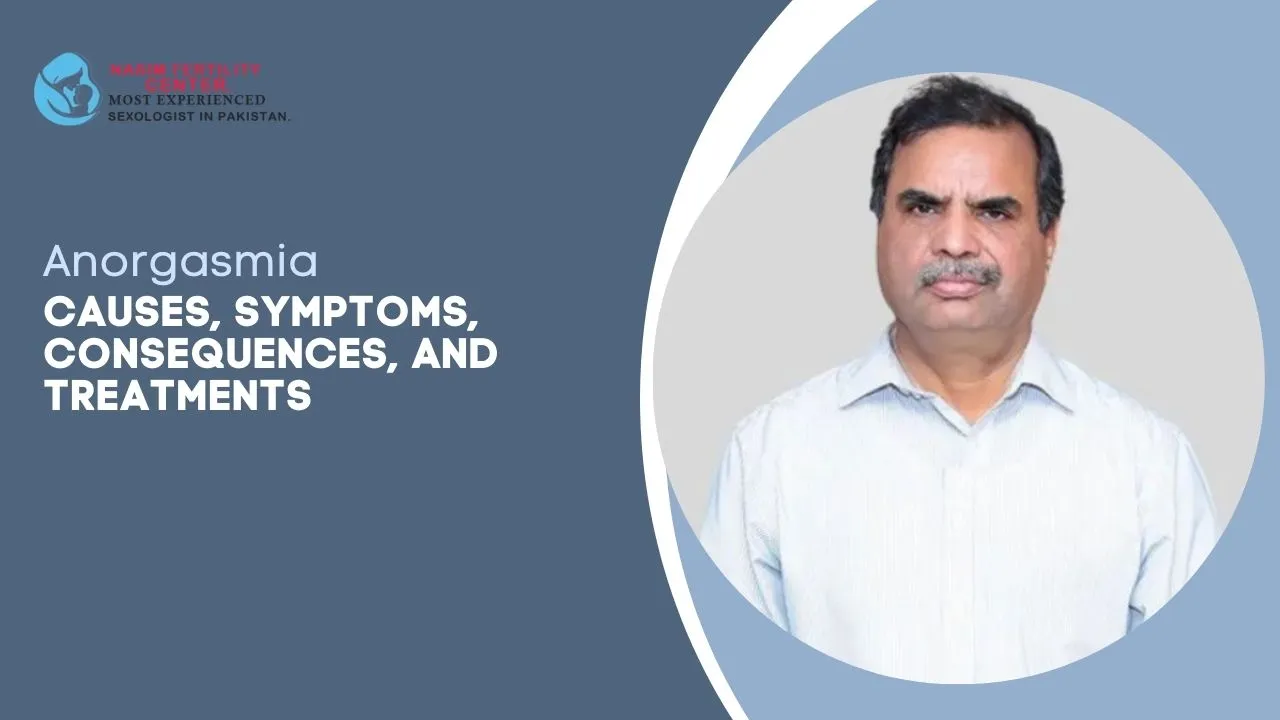
Anorgasmia, a condition characterized by the inability to achieve orgasm despite adequate sexual stimulation, affects many individuals in Pakistan and worldwide.
As a sexologist at Nasim Fertility Center, I have seen firsthand the distress and frustration this condition can cause. In this article, we will delve into the causes, symptoms, consequences, and available treatments for anorgasmia.
What is Anorgasmia?
Anorgasmia is defined as the persistent or recurrent difficulty, delay in, or absence of attaining orgasm after sufficient sexual stimulation. It can be classified into different types:
- Lifelong or primary anorgasmia: The individual has never experienced an orgasm.
- Acquired or secondary anorgasmia: The individual has previously experienced orgasms but now has difficulty reaching climax.
- Situational anorgasmia: Orgasm is only achievable under certain circumstances, such as with specific partners or stimulation.
Anorgasmia can affect both men and women, although it is more common in females. In Pakistan, studies suggest that anorgasmia may affect up to 26.3% of individuals in certain populations.

Causes of Anorgasmia
The causes of anorgasmia are multifactorial and can include physical, psychological, and relationship factors. Some common causes include:
- Medications: Certain antidepressants (particularly SSRIs), antipsychotics, and opioids can interfere with orgasm.
- Hormonal imbalances: Low testosterone, hypothyroidism, and hyperprolactinemia may contribute to anorgasmia.
- Penile sensation loss: Reduced sensitivity due to aging, diabetes, or nerve damage can make achieving orgasm more difficult.
- Psychological factors: Anxiety, depression, stress, past sexual trauma, and relationship issues can all play a role in anorgasmia.
- Chronic stimulation: Excessive masturbation or the use of vibrators may lead to decreased sensitivity and difficulty reaching orgasm with a partner.
Kya aap taluq ke dauran orgasm nahi mehsoos kar pate (Anorgasmia)?
Dr. Farooq Nasim Bhatti, Pakistan ke expert sexologist se confidential consultation lein — science-based treatment ke zariye apni sexual health aur satisfaction wapas payein.

Symptoms and Consequences of Anorgasmia
The primary symptom of anorgasmia is the inability to reach orgasm despite adequate sexual stimulation. This can lead to frustration, distress, and dissatisfaction with one’s sex life. Anorgasmia can also strain relationships, as partners may feel inadequate or blame themselves for their partner’s inability to climax.
Men with anorgasmia may experience anxiety and frustration, which can lead to other sexual problems such as erectile dysfunction and loss of sex drive. For men with reproductive interests, anorgasmia can also result in infertility due to the inability to ejaculate.
Diagnosing Anorgasmia
Diagnosing anorgasmia involves a thorough medical history and physical examination to identify potential underlying causes. Your healthcare provider may ask about your sexual experiences, relationships, and any medications you are taking. They may also perform a pelvic exam or refer you to a specialist, such as a gynecologist or urologist, for further evaluation.
How is anorgasmia diagnosed?
Diagnosing anorgasmia involves a thorough medical history and physical examination by a healthcare provider to identify potential underlying causes. They will ask about your sexual experiences, relationships, medications, and any physical or mental health conditions. A pelvic exam may be performed. You may also be asked to fill out a questionnaire about your symptoms and sexual history. Further evaluation by a gynecologist or other specialist may be recommended.
Also Read: Nightfall Causes
Anorgasmia Treatment Options
Treatment for anorgasmia depends on the underlying cause and may involve a combination of approaches. Some treatment options include:
- Addressing underlying medical conditions: Treating hormonal imbalances, diabetes, or other contributing factors can improve orgasmic function.
- Medication adjustments: Switching from SSRIs to alternative antidepressants with fewer sexual side effects, such as bupropion, may help alleviate anorgasmia.
- Sex therapy and counseling: Working with a sex therapist can help individuals and couples address psychological and relationship factors contributing to anorgasmia.
- Sensate focus exercises: These exercises involve non-erotic touch and gradually progress to more intimate stimulation, helping individuals become more comfortable with their bodies and sexual sensations.
- Directed masturbation: Learning to explore one’s own body and identify pleasurable stimulation can be beneficial for those with anorgasmia.
- Vibrators and arousal oils: Using sexual aids and lubricants may enhance stimulation and improve the likelihood of achieving orgasm.
While there is no definitive timeline for curing anorgasmia, many individuals see improvement with consistent treatment and open communication with their healthcare provider and partner.
Also Read: Sexual Trauma
How is anorgasmia treated?
Treatment for anorgasmia depends on the underlying cause and may involve a combination of approaches. This can include addressing medical conditions, adjusting medications, sex therapy, sensate focus exercises, directed masturbation, and using sexual aids like vibrators.
Hormone therapy with estrogen or testosterone is sometimes used but requires careful consideration of risks and benefits. Working with a sex therapist can help address psychological and relationship factors.
Medications that may impact orgasm
Several medications can interfere with the ability to achieve orgasm. Selective serotonin reuptake inhibitors (SSRIs) used to treat depression are well known for causing sexual side effects like difficulty reaching orgasm. Other medications that may impact orgasm include antipsychotics, blood pressure medications, antihistamines, and opioid pain medications.
If you suspect a medication is affecting your ability to orgasm, discuss this with your healthcare provider. They may be able to adjust your dosage or switch you to an alternative medication with fewer sexual side effects.
How long does it take to cure anorgasmia?
The timeline for treating anorgasmia varies depending on the individual and the underlying causes. With consistent treatment and open communication with healthcare providers and partners, many people see improvement over time. However, there is no definitive cure or set timeline.
Primary anorgasmia, where orgasm has never been experienced, can be more difficult to treat than secondary anorgasmia. Progress requires patience and managing expectations.
Is anorgasmia preventable?
While some causes of anorgasmia, like medical conditions or medication side effects, may not be preventable, there are steps that may reduce the risk. This includes maintaining open communication with partners, managing stress, and addressing psychological factors.
Being proactive about sexual health by having open discussions with healthcare providers is also important. However, anorgasmia can still occur even in healthy individuals due to a complex interplay of physical, psychological and relationship factors.
What’s the outlook if I have anorgasmia?
With proper treatment and support, many people with anorgasmia are able to experience improvement in their sexual function and satisfaction. Working closely with qualified healthcare providers to identify and address underlying causes is key.
It’s important to have patience with the process and maintain open communication with partners. Although anorgasmia can be distressing, it is a treatable condition, and enjoying a fulfilling sex life is possible with the right combination of medical, psychological and relationship support.
Expertise of Dr. Farooq Nasim Bhatti
At Nasim Fertility Center, we are fortunate to have the expertise of Dr. Farooq Nasim Bhatti, a renowned sexologist and the first recognized MBBS, FAACS (USA), diplomate of the American Board of Sexology (USA) in Pakistan. With over 31 years of experience, Dr. Bhatti has presented research on various sexual dysfunctions at international conferences and established himself as a qualified professional in treating infertility and sexual disorders.
Dr. Bhatti and his team at Nasim Fertility Center offer comprehensive treatment for anorgasmia and other sexual health concerns, such as premature ejaculation (PE) and erectile dysfunction (ED). With locations in Lahore, Islamabad, and Faisalabad, as well as online consultations for patients in other cities, Nasim Fertility Center is dedicated to providing accessible, high-quality care for individuals throughout Pakistan.
Conclusion
Anorgasmia is a complex condition that can significantly impact an individual’s sexual satisfaction and overall well-being. By understanding the causes, symptoms, and available treatments, individuals in Pakistan and beyond can take steps towards improving their sexual health. At Nasim Fertility Center, Dr. Farooq Nasim Bhatti and his team are committed to providing expert care and support for those struggling with anorgasmia and other sexual dysfunctions as he is best sexual health treatment expert in Lahore, Islamabad and Faisalabad.
If you are experiencing symptoms of anorgasmia or have concerns about your sexual health, don’t hesitate to reach out to a qualified professional like Dr. Bhatti. With the right treatment and support, it is possible to overcome anorgasmia and enjoy a fulfilling sex life.
Disclaimer
This information is for educational purposes and not the treatment. For treatment, you need to consult the doctor.

Dr. Farooq Nasim Bhatti (MBBS, FAACS – USA, Diplomate: American Board of Sexology, CST, HSC – Hong Kong, CART – Malaysia & China) is a qualified medical sexologist with 30+ years of experience. He has presented 21+ research papers internationally and treats sexual dysfunction through sex therapy, counseling, and pharmacotherapy to restore natural sexual function without temporary medication.

Regain Confidence with Our ED Solutions
Explore effective treatments for erectile dysfunction. Take charge of your intimacy today.


